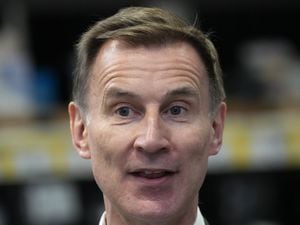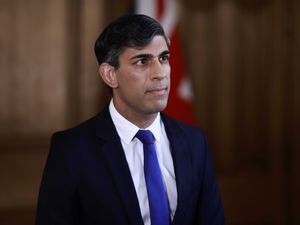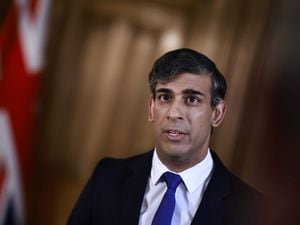NHS to create thousands more beds and boost 999 staff numbers ahead of winter
Winter is the busiest period and health leaders expect the combination of Covid and flu to pile yet more pressure on already stretched services.
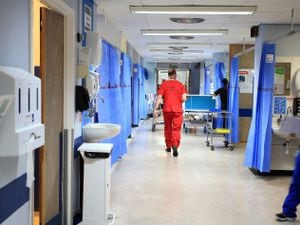
The NHS will create thousands more beds and recruit more emergency call handlers as part of plans to boost capacity ahead of what is expected to be a busy winter.
Winter is usually the busiest period for the NHS and health leaders expect the combination of Covid and flu to pile yet more pressure on already stretched services.
NHS England said that to prepare for additional pressures the equivalent of 7,000 more general and acute beds will be created through a mixture of new hospital beds, virtual wards and initiatives to improve patient flow.
It also said the health service will recruit more call handlers across the country so there are at least 4,800 staff working in NHS 111 and 2,500 in 999 call rooms.
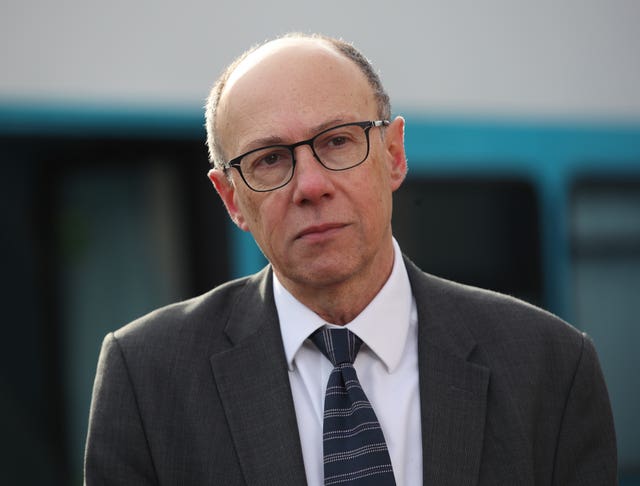
NHS England said the additional 999 capacity will help staff meet record demand, with a “live 999 call answer dashboard” and a target to answer calls in an average of 10 seconds.
The package of measures includes an extra £10 million for mental health services throughout the winter to deal with record demand and mental health professionals being deployed in 999 call centres to direct people in crisis towards appropriate services.
GP services will be supported through the recruitment of extra social prescribing link workers and health and wellbeing coaches to support patients with other needs, NHS England added.
Professor Sir Stephen Powis, NHS national medical director, said the NHS was “taking every step possible” to ensure it was prepared for any additional pressure in winter.
He added: “Winter is always a busy period for the NHS, and this is the first winter where we are likely to see combined pressures from Covid and flu, so it is right that we prepare as early as we can for the additional demand that we know we will face.
“Ahead of the winter, we want to make sure we are doing everything we possibly can to free up capacity so that staff can ensure patients get the care they need – this includes timely discharge, working with social care, and better support in the community with the expansion of virtual wards.
“As ever, it is vital that the public continues to use NHS services in the usual way including using 999 in an emergency and using NHS 111 online for other health issues.”
NHS England also said that the health service will work more closely with social care to make sure patients are able to leave hospital as quickly as possible with the right care and support to stay well in their homes.
Planning is also under way for an autumn Covid-19 booster programme as well as the annual flu campaign.
The package comes the day after the latest NHS performance figures showed accident and emergency departments in England had one of their worst months in July, with record numbers of patients waiting more than 12 hours to be admitted and the lowest proportion of people being seen within four hours.
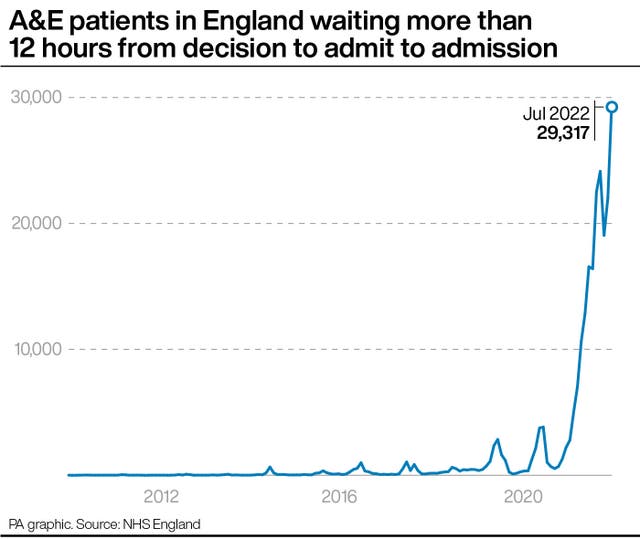
It was also the joint worst month for response times by ambulances dealing with the most urgent incidents, new figures from NHS England show.
During July, which included the heatwave that caused major disruption to travel and fires around the country, staff dealt with more than 85,000 Category 1 ambulance callouts, NHS England said.
That was the highest number since records began and almost two thirds higher than the 51,771 in July 2020, it added.
It said the new figures, published on Thursday, showed the “challenges” faced by staff freeing up beds, and that pressures in areas like social care were impacting on the ability to discharge patients.
Health experts said that despite the record temperatures, the new figures were more like a health service “stuck in the depths of a particularly dire winter”.
Earlier this week Health Secretary Steve Barclay told the Telegraph the Department of Health is preparing contingency plans for “reasonable worst-case scenarios” ahead of winter and that hiring more foreign nurses to work in social care could enable quicker discharges from hospitals.
Health leaders welcomed the new package of support, but said action was needed to plug workforce gaps and retain existing staff.
Sir Andrew Goddard, president of the Royal College of Physicians, said: “It is very welcome that NHS England is already preparing for winter by increasing capacity.
“But without any significant Government intervention to retain and rapidly increase the workforce, any plan will fall short.
“They all need people to deliver them, and it’s people we’re really lacking.”
NHS Providers’ interim chief executive Saffron Cordery added: “We welcome this national recognition of the intense challenges all trusts – hospitals, ambulance, mental health and community services – face, and the early acknowledgment that this winter is going to be very pressured for the NHS with the prospect of rising operational pressures, Covid-19 and an early flu season.
“We need to be crystal clear that we must have the workforce and funding in place to deliver this now and for the longer term.
“We also know that while the steps outlined today are welcome, these are a sticking plaster for the fault lines which the NHS has endured for too long and will not be enough to keep trust leaders’ worries about this winter at bay.
“We desperately need to see a long term workforce plan to recruit and retain staff, capital investment, proper investment in preventive healthcare and social care reform.”

